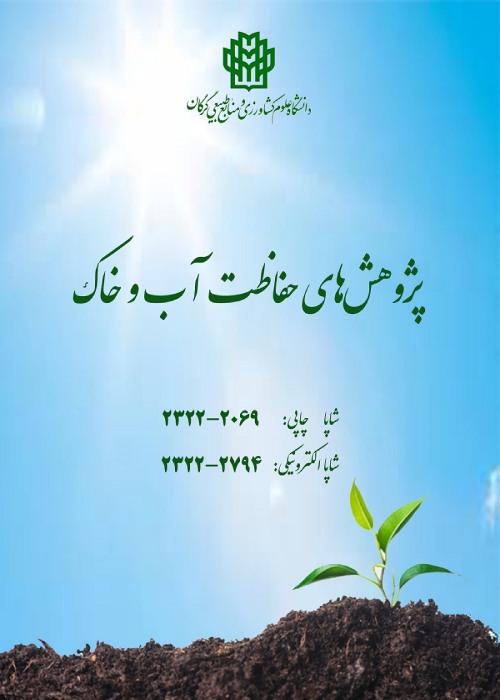Feasibility of Reducing Soil Loss using Biochar Produced from Dairy Factory Waste
Article Type:
Research/Original Article (دارای رتبه معتبر)
Abstract:
Background And Objectives
Today, conversion of industrial wastes using methods with the least environmental detrimental effects and profitable application is supposed as a fundamental solution to manage huge quantity of waste material produced in different industries. In this regard, conversion and reuse of hugely and intensive extension of produced dairy factory waste are possible solutions in order to achieve sustainable development. However, the direct or applied application of industrial wastes for soil conservation has not been reported yet. Accordingly, the present study was planned to assess the feasibility of industrial wastes produced biochar in soil erosion control under laboratorial conditions.Materials And Methods
In order to conduct the present study, some industrial wastes of the Kaleh Amol Dairy Factory were examined for chemical properties. It was then converted to biochar under temperature of 300 to 350 °C and applied for soil conservation in three levels of 400, 800 and 1200 g m-2 on small experimental plots filled by erosion prone soil of Marzanabad Region in Mazandaran Province, northern Iran. The plots were subjected to rainfall simulation with intensities of 50 and 90 mm h-1 after a span time of 35 days on biochar application in the Rainfall and Erosion Laboratory of Tarbiat Modares University. Study rain were simulated based on intensity-duration-frequency relationships developed for the station at the vicinity of the soil origin. Ultimately, sediment concentrations were measured during simulation and just after commencement of runoff and the soil erosion was consequently calculated.Results
The results of the present experiments under laboratorial conditions showed that the maximum soil erosion occurred in control plots. So that, the sediment concentrations for treated plots with 400, 800 and 1200 g m-2 of biochar were 47, 52 and 49 % for rain intensity of 50 mm h-1, and 36, 51 and 54 % for rain intensity of 90 mm h-1 of those recorded for control plots at confidence level of 99 %, respectively. The soil erosion rates for the same treatments were also significantly (PConclusion
The results of this study suggested a positive effect of application of biochar produced from industrial wastes of dairy factory on reduction of sediment concentration and soil erosion. The conversion of aforesaid industrial wastes to biochar is therefore recommended for soil conservation. Keywords:
Language:
Persian
Published:
Water and Soil Conservation, Volume:24 Issue: 4, 2017
Pages:
211 to 226
magiran.com/p1774759
دانلود و مطالعه متن این مقاله با یکی از روشهای زیر امکان پذیر است:
اشتراک شخصی
با عضویت و پرداخت آنلاین حق اشتراک یکساله به مبلغ 1,390,000ريال میتوانید 70 عنوان مطلب دانلود کنید!
اشتراک سازمانی
به کتابخانه دانشگاه یا محل کار خود پیشنهاد کنید تا اشتراک سازمانی این پایگاه را برای دسترسی نامحدود همه کاربران به متن مطالب تهیه نمایند!
توجه!
- حق عضویت دریافتی صرف حمایت از نشریات عضو و نگهداری، تکمیل و توسعه مگیران میشود.
- پرداخت حق اشتراک و دانلود مقالات اجازه بازنشر آن در سایر رسانههای چاپی و دیجیتال را به کاربر نمیدهد.
In order to view content subscription is required
Personal subscription
Subscribe magiran.com for 70 € euros via PayPal and download 70 articles during a year.
Organization subscription
Please contact us to subscribe your university or library for unlimited access!



